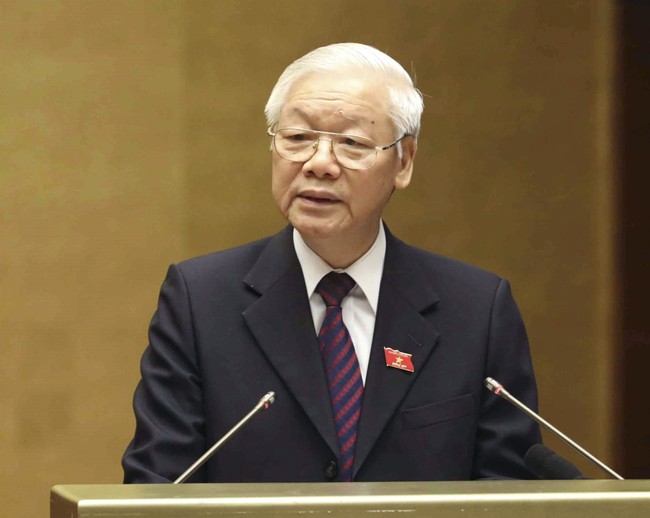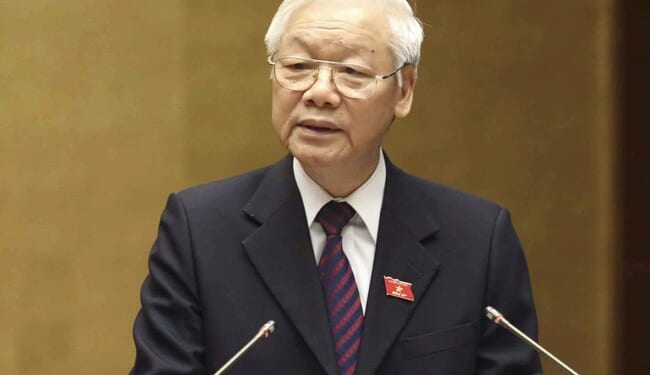
Truong My Lan, a Vietnamese property developer, was convicted of taking out $44 billion in “ghost loans” from the Saigon Commercial Bank (SCB) and was sentenced to death. She managed the feat over 11 years as the Communist country relaxed its strict controls on the economy.
Now, $44 billion is a lot of money. Some might point to Saddam Hussein’s “oil for food” scam as being the largest fraud in world history. And while the possible half a trillion dollars in COVID-19 relief fraud certainly makes the list, that criminal activity involved thousands of people. Lan’s fraud was mostly her own corruption.
The Communists were eager to publicize the trial — a rarity in Vietnam. According to the BBC, “2,700 people were summoned to testify, while 10 state prosecutors and around 200 lawyers were involved.” There were dozens of boxes of evidence weighing six tons.
There wasn’t much subtlety about the fraud. Lan was already a wealthy woman in 2011 after getting her start selling cosmetics in a stall in downtown Saigon. But when the Communists began to loosen controls, she started to invest in real estate, acquiring hotels and office buildings with ease.
She got her big break in 2011 when she was allowed to merge three failing banks into one — the Saigon Commercial Bank.
Vietnamese law prohibits any individual from holding more than 5% of the shares in any bank. But prosecutors say that through hundreds of shell companies and people acting as her proxies, Truong My Lan actually owned more than 90% of Saigon Commercial.
They accused her of using that power to appoint her own people as managers, and then ordering them to approve hundreds of loans to the network of shell companies she controlled.
The amounts taken out are staggering. Her loans made up 93% of all the bank’s lending.
The court claimed that “her actions “not only violate the property management rights of individuals and organizations but also push SCB (Saigon Joint Stock Commercial Bank) into a state of special control, eroding people’s trust in the leadership of the Party and State.”
Lan maintains her innocence. The court sentenced her to death as a way to recover at least some of the $44 billion she stole. So far, she’s not budging.
Before 2011, Lan’s company, Van Thinh Phat, grew to become one of Vietnam’s richest real estate concerns. That’s probably why no one took a second look when Lan’s driver withdrew $4 billion over a three-year period.
According to prosecutors, over a period of three years from February 2019, she ordered her driver to withdraw 108 trillion Vietnamese dong, more than $4bn (£2.3bn) in cash from the bank, and store it in her basement.
That much cash, even if all of it was in Vietnam’s largest denomination banknotes, would weigh two tonnes.
She was also accused of bribing generously to ensure her loans were never scrutinised. A former chief inspector at the central bank was given a life sentence for accepting a $5m bribe.
In one of the most surveilled states in the world, how did she get away with it for so long?
“I am puzzled,” says Le Hong Hiep, who runs the Vietnam Studies Program at a Singapore think tank.
“Because it wasn’t a secret. It was well known in the market that Truong My Lan and her Van Thinh Phat group were using SCB as their own piggy bank to fund the mass acquisition of real estate in the most prime locations.”
In situations like this, you have to figure that Lan was paying off the right people. In fact, 87 co-defendants were also found guilty, including Lan’s niece.
“It was obvious that she had to get the money from somewhere,” said Hiep. “But then it is such a common practice. SCB is not the only bank that is used like this. So perhaps the government lost sight because there are so many similar cases in the market.”
Retired U.S. State Department official David Brown believes that Lan was protected by powerful interests in the South but that now the communists in the North want to reassert control over the freewheeling entrepreneurs in the South.
“Up until 2016 the party in Hanoi pretty much let this Sino-Vietnamese mafia run the place, Brown said. “They would make all the right noises that local communist leaders are supposed to make, but at the same time they were milking the city for a substantial cut of the money that was being made down there.”
If Hiep is right, this won’t be the last fraud trial in Saigon.

